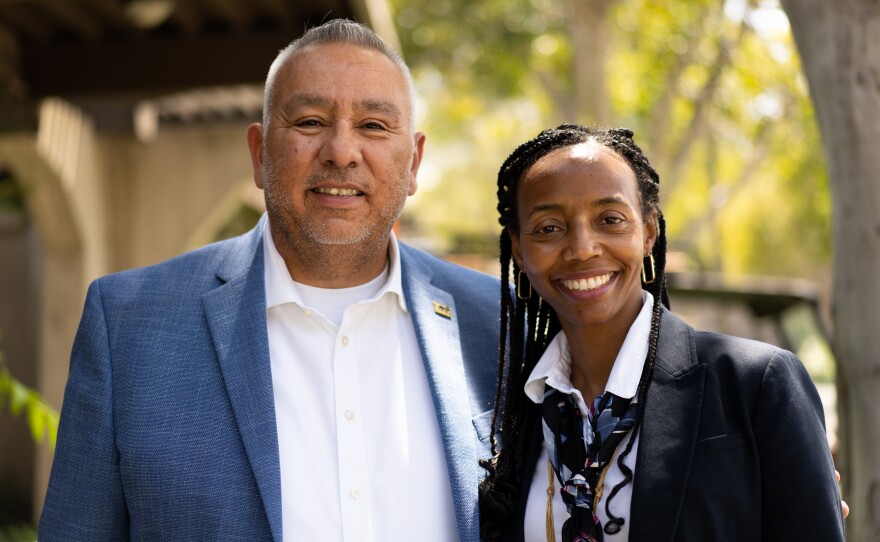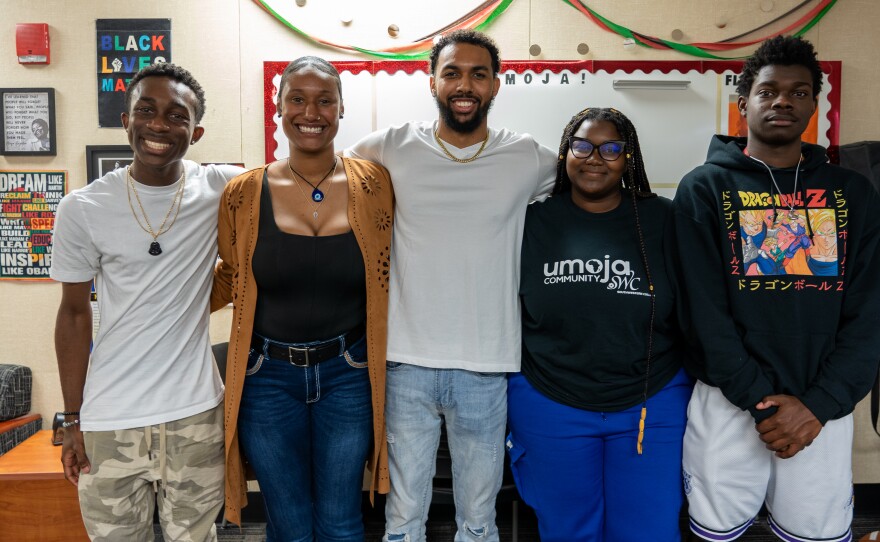On Thursday, KPBS reported how two former professors are suing Southwestern College for retaliation after reporting racial discrimination.
It’s not the first accusation of racism against Southwestern.
In 2018, a University of Southern California assessment found a “palpable climate of anti-Blackness” at Southwestern College.
Of the nearly 50 colleges and universities the team had assessed, the report said, the stories they heard from Southwestern employees were the worst they’d encountered.
Current president Mark Sanchez inherited Southwestern’s racial challenges when he accepted the position in 2020.
Transfer rates for Black male students to four-year colleges were in the single digits, he said.
“I would venture to say that was probably one of the lowest transfer rates in the state at a California community college. So I knew the situation was urgent,” he said.
Community colleges offer associate degrees, but to earn a bachelor’s degree, students need to transfer to a four-year college.
He said a lot of students rely on public transit — which makes getting to even the nearby four-year colleges difficult — so he worked on convincing more programs to offer their classes on Southwestern’s campus.
Arizona State University will launch a program there in August, he said, and UC San Diego is looking to bring physician assistants and bachelor of nursing programs in the fall semester.
After the 2018 report came out, Southwestern created an equity officer position and hired Janelle Williams Melendrez.
She focused on a key question: Who is being invited to interviews, who is hired as a result?
Melendrez said they see much more diversity in candidate pools and hiring now.
While overall diversity is increasing, the number of African American faculty and administrators is trending down.
They won’t have this years’ final numbers until August, but Sanchez said one metric is making him optimistic — he said they’re starting to see an uptick in Black student enrollment.

The school also offers a learning community geared toward African American students, called Umoja.
Umoja’s community room walls are covered with photos of Black icons like Toni Morrison and Malcolm X.
On the whiteboard someone scrawled: “Never let anyone bring you down. You got to keep going.”
Five students gathered there on a May afternoon to discuss what Southwestern is like today for Black students, who make up 4% of enrollment.
In many ways, what they share are universal stories of being a minority.
The students said they have Black leaders to look to on campus, and they have each other.
First-year Nikki White said when she sees another Black student, “I'm gonna holler at you, because I don't see a lot of us walking around like that.”
But when they go to class, they’re often the only Black student in the room.
They described a pressure to represent all Black people well.
First-year Dwight Howell Junior said his teacher kept asking for his input on environmental racism.
“But I didn’t even know what environmental even was,” he said.
He felt like he wasn’t just letting himself down, but all the Black people on campus.
“I feel like since there's not a lot of us here, all of us have, like, a certain job that we have to do,” Howell explained. “We have to present ourselves in a certain way so we can uphold our reputation and stuff like that.”
The room murmured in agreement.
“We really get held at a high standard, like to the point where we can’t breathe,” said White. “Because it's like everybody, like everybody — the campus, the hood — is, like, banking on us to make it so that we can open that door. And I'm not going to sit here and lie. I am very disciplined, but it is stressful.”
Howell said it’s stressful not just physically, but mentally, “Because we also feel like that, ‘Oh, I got to do this. Oh, I got to do this. Oh, I got to walk straight. I got to keep my back up. I got to clap my hands a certain way ... ’”
The room laughed at his pantomime. Everyone could relate.
Jose Jackson, a football player and second-year student, explained the stakes: “Statistically, physically, even mentally, you have to beat the system because people are going to look at us and racially profile us and not even say anything.”
White said she gives herself pep talks: “I'm constantly telling myself, like, ‘I am the best. Like, I will graduate. I will be somebody who is a leader.’”
Aside from challenges facing many Black students on campuses across the country, the students said they’ve felt supported at Southwestern.
“The most amazing part about being here on campus as a Black student is the resources,” said Umoja president and first-year Victoria Ayekof – resources like tours of historically Black colleges, internships and scholarships.
But, she said, “It's kind of like a double-edged sword because so many people don't know about it.”
Learning communities like Umoja have a limited number of spots. Ayekof wants to join student leadership to help all Black students benefit from the community Umoja offers.
The students said they hadn’t heard about the recent lawsuit or the 2018 report, but they believe the claims.
They know friends who’ve had bad experiences as Black students. And Ayekof said she’s heard there’s history from longtime Black staff.
“They've paved the way for us because they weren't — what's it called? — supported, when they originally wanted to start a program like Umoja,” she said.
She said Black issues are out in society now, not things that are “unknown, or impossible to realize.”
“It's at a point where we've done a lot of fighting and a lot of vocalizing,” she said, “and it's up to others to actually take that into consideration or to choose to be complacent with the system.”







